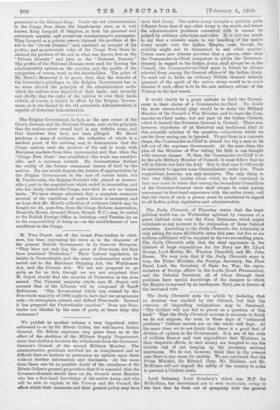We publish in another column a very important letter addressed
to us by Sir Edwin Collen, the well-known Indian General. Sir Edwin expresses very grave fears as to the effect of the abolition of the Military Supply Department, since that abolition involves the withdrawal from the Governor- General's Council of the second Military Member. The administrative problems involved are so complieated and so difficult that we hesitate to pronounce an opinion upon them without further information and discussion. At the same time, there can be no possible doubt of the soundness of Sir Edwin Colon's general proposition that it is essential that the Governor-General should have on his Council some Member who has a first-hand knowledge of the native Army, and who will be able to explain to the Viceroy and the Council the effect which their measures and their general policy may have upon that Army. The native Army occupies a position quite different from that of any other Army in the world, and hence the administrative problems connected with it cannot be judged by ordinary principles and rules. It is not too much to say that a mistake made in our handling of the native Army might ruin the Indian Empire, even though its stability might not be threatened in any other quarter. Unless some new scheme provides that a person, other than the Commander-in-Chief, competent to advise the Governor- General in regard to the Indian Army, shall always be on the Council, the Commander-in-Chief must in future be always selected from among the General officers of the Indian Army. To send out to India an ordinary British General entirely ignorant of the spirit of the native Army would be to court disaster if such officer is to be the sole military adviser of the Viceroy in the last resort.









































 Previous page
Previous page